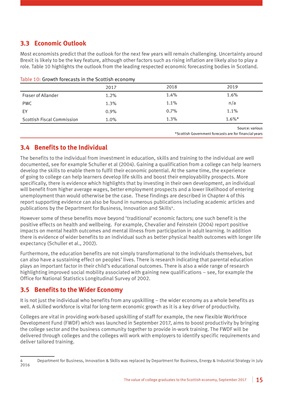
15
The value of college graduates to the Scottish economy, September 2017
3.3 Economic Outlook
Most economists predict that the outlook for the next few years will remain challenging. Uncertainty around
Brexit is likely to be the key feature, although other factors such as rising inflation are likely also to play a
role. Table 10 highlights the outlook from the leading respected economic forecasting bodies in Scotland.
Table 10: Growth forecasts in the Scottish economy
2017 2018 2019
Fraser of Allander 1.2% 1.4% 1.6%
PWC 1.3% 1.1% n/a
EY 0.9% 0.7% 1.1%
Scottish Fiscal Commission 1.0% 1.3% 1.6%*
Source: various
*Scottish Government forecasts are for financial years
3.4 Benefits to the Individual
The benefits to the individual from investment in education, skills and training to the individual are well
documented, see for example Schuller et al (2004). Gaining a qualification from a college can help learners
develop the skills to enable them to fulfil their economic potential. At the same time, the experience
of going to college can help learners develop life skills and boost their employability prospects. More
specifically, there is evidence which highlights that by investing in their own development, an individual
will benefit from higher average wages, better employment prospects and a lower likelihood of entering
unemployment than would otherwise be the case. These findings are described in Chapter 4 of this
report supporting evidence can also be found in numerous publications including academic articles and
publications by the Department for Business, Innovation and Skills4.
However some of these benefits move beyond 'traditional' economic factors; one such benefit is the
positive effects on health and wellbeing. For example, Chevalier and Feinstein (2004) report positive
impacts on mental health outcomes and mental illness from participation in adult learning. In addition
there is evidence of wider benefits to an individual such as better physical health outcomes with longer life
expectancy (Schuller et al., 2002).
Furthermore, the education benefits are not simply transformational to the individuals themselves, but
can also have a sustaining effect on peoples' lives. There is research indicating that parental education
plays an important factor in their child's educational outcomes. There is also a wide range of research
highlighting improved social mobility associated with gaining new qualifications - see, for example the
Office for National Statistics Longitudinal Survey of 2002.
3.5 Benefits to the Wider Economy
It is not just the individual who benefits from any upskilling - the wider economy as a whole benefits as
well. A skilled workforce is vital for long-term economic growth as it is a key driver of productivity.
Colleges are vital in providing work-based upskilling of staff for example, the new Flexible Workfroce
Development Fund (FWDF) which was launched in September 2017, aims to boost productivity by bringing
the college sector and the business community together to provide in-work training. The FWDF will be
delivered through colleges and the colleges will work with employers to identify specific requirements and
deliver tailored training.
4 Department for Business, Innovation & Skills was replaced by Department for Business, Energy & Industrial Strategy in July
2016